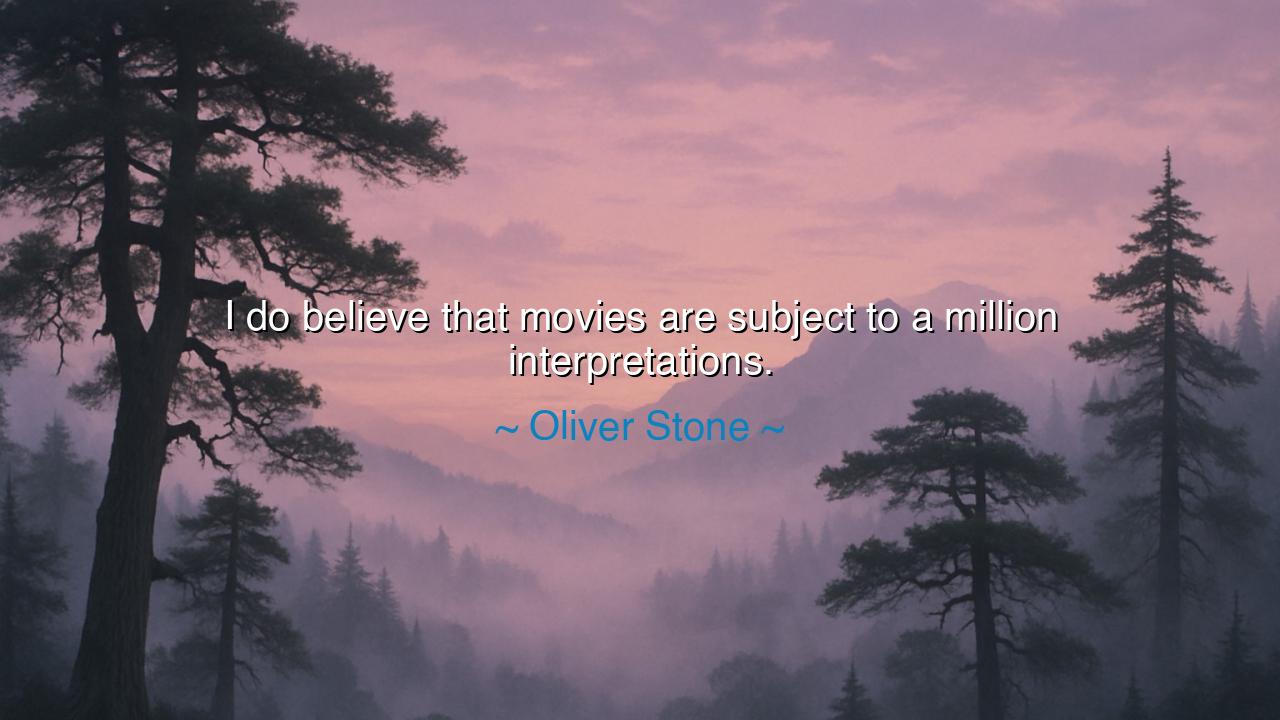
I do believe that movies are subject to a million






Listen closely, O children of the future, for the words of Oliver Stone reveal a deep truth about the nature of art and the human experience: "I do believe that movies are subject to a million interpretations." In this simple statement lies a profound understanding of the power of film—how it captures the complexity of human life and opens the door to countless meanings. Just as the ancient philosophers pondered the mysteries of the universe, so too do we, the audience, ponder the meanings hidden within a single frame, a scene, or a story. A film, like all great art, is a mirror that reflects not just the world of its creation but the world of the viewer—shaped by their experiences, beliefs, and perspectives.
In the ancient world, O children, the greatest works of art, whether in the form of epic poems or sculptures, were those that could be interpreted in a thousand ways. Homer's epics, the Iliad and the Odyssey, have been read by countless generations, each finding something new within their lines. A warrior may see the Iliad as a story of honor and courage, while a philosopher may see it as a reflection on the fragility of life and the destructive power of fate. Each reader’s interpretation is shaped by their own experiences, and this is the true power of art—it speaks to everyone, but each person hears it differently. Stone’s words remind us that a film, like these ancient works, can hold within it a world of meanings, waiting to be discovered by each individual who gazes upon it.
Consider, O children, the example of Leonardo da Vinci's Mona Lisa. The painting has been interpreted in countless ways over the centuries. Some see her smile as a symbol of mystery, while others see it as a reflection of humanity's complexity—neither good nor evil, but a blend of all emotions. What makes the Mona Lisa so enduring, so captivating, is that it does not offer a single, fixed meaning. Instead, it invites the viewer to find their own interpretation, to see in her face what they bring with them. So too, movies are like this—each film holds multitudes, offering something different to each person who engages with it.
Stone’s insight into film also highlights the subjectivity of art. The same film can be experienced in radically different ways by different audiences. For some, a film may be a reflection of society's injustices, while for others, it may be a story of personal triumph. A war film may resonate as a critique of violence and warfare to one viewer, while to another, it might serve as an exploration of heroism and sacrifice. This multiplicity of interpretations is not a flaw of the film, but rather its strength. It is a testament to the complexity of human experience, where no two lives are identical, and no two perspectives can ever fully align.
Take, for example, the film "The Godfather", a masterpiece by Francis Ford Coppola. To some, it is a story of the American Dream, illustrating how an immigrant family rises to power, while to others, it is a tragic exploration of the corruption of power and the price of loyalty. The Godfather does not offer a singular interpretation, but rather opens itself up to a thousand readings, each shaped by the lens through which we view the world. This is what makes the film timeless, and Stone’s belief about movies being subject to a million interpretations is reflected in the way "The Godfather" continues to spark new discussions with every viewing.
Thus, O children, the lesson is clear: art, whether it be film, music, or literature, is not meant to present a single, unchanging truth, but to open the door to multiple possibilities. Just as Homer’s stories were reinterpreted by each new generation, so too are the films we watch. The meaning of a film is shaped not only by its creator but by the viewer’s journey—their own thoughts, emotions, and experiences. When you watch a film, do not look for one fixed interpretation; instead, open your heart and mind to the many layers of meaning it may reveal to you. Let each viewing be an opportunity to discover something new, not just about the film, but about yourself.
In your own lives, O children, carry this wisdom forward: embrace the multiplicity of perspectives that life offers. Just as movies can have countless interpretations, so too can your experiences be viewed through many lenses. Never be afraid to see things from a different angle, to challenge your own assumptions, and to welcome the richness of life that comes from diverse viewpoints. In this way, you will grow not just in understanding, but in wisdom, for the world is not a place of fixed truths, but a vast canvas, awaiting the countless brushstrokes of your experiences and interpretations.






AAdministratorAdministrator
Welcome, honored guests. Please leave a comment, we will respond soon